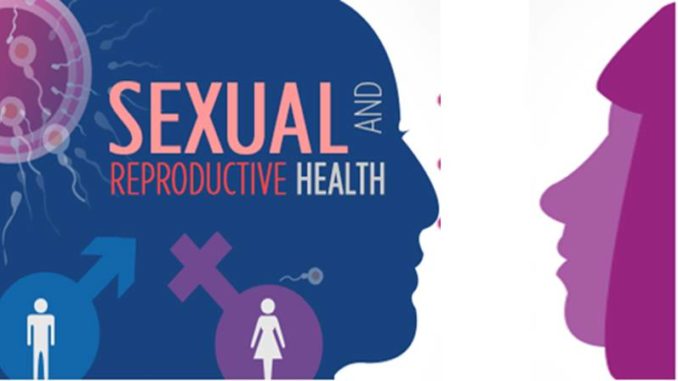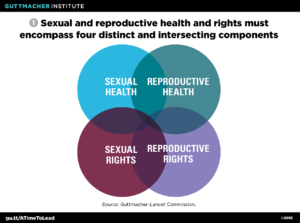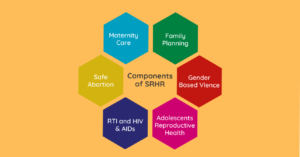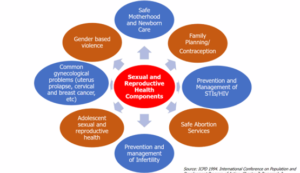
Table of Contents
What is Sexual Health?
- WHO defines Sexual Health as “a state of physical, emotional, mental and social well-being in relation to sexuality; it is not merely the absence of disease, dysfunction or infirmity”.
- Sexual health is fundamental to overall health and well-being of individuals, couples and families
- Sexual health requires a positive and respectful approach to sexuality and sexual relations to view it.
- Sexual health related issues are comprehensive and covers both positive and negative consequences.
- Positive consequences of good sexual health will lead to pleasurable sex and safe sexual relations.
- On the other hand, negative consequences of sexual health will include conditions such as unintended pregnancy, sexual dysfunction, sexual violence, STI’s, harmful practices like Female Genital Mutilation (FGM) etc.
Factors that play a major role to achieve sexual health and well-being are:
- Access to good quality information about sex and sexuality
- Knowledge about the risk’s vulnerability to adverse consequences of unprotected sexual activity
- Ability to access sexual health care
- Environment that affirms and promotes sexual health.
What is Reproductive Health?
- WHO defines Reproductive Health as “a state of complete physical, mental and social well-being and not merely the absence of disease or infirmity, in all matters relating to the reproductive system and to its functions and processes”.
- Reproductive health ensures that people are able to have satisfying and safe sex life and that they have the capability to reproduce and the freedom to decide if, when and how often.
- Reproductive health also includes the right of men and women to be informed and have access to safe, effective and affordable family planning of their choices.
- It also incorporates the right to access appropriate reproductive health services.
- Reproductive health is a crucial part of overall health and is central to human development which affects everybody.
What is Sexual and Reproductive Health (SRH)?
- Sexual and Reproductive Health (SRH) is a state of physical, emotional, mental, and social well-being in relation to all aspects of sexuality and reproduction.
- Sexual and Reproductive Health (SRH) is a combination of sexual health and reproductive health.
- SRH includes several components such as approach to safe sex, family planning, desired family size, safe abortion, information and may more
- SRH includes the issues of both men and women.
- Sexual and reproductive health is not just about sex. It includes different things such as:
- Sexuality
- Changes during puberty
- Relationships
- Sexually Transmitted Diseases (STDs) and Sexually Transmitted Infections (STIs)
- Family planning
- Contraception
- Pregnancy
Components/Scope of Sexual and Reproductive Health (SRH)
- Family planning counseling, information, education, communication and services
- Safe motherhood; education and services for healthy pregnancy, safe delivery and post-natal care
- Care of new born
- Prevention and management of complications of abortions
- Preventions and management of RTIs, STIs, HIV and AIDS and other reproductive health conditions
- Information, education, counseling on human sexuality, reproductive health and responsible parenthood for individuals, couples and adolescent
- Prevention and management of sub-fertility
- Life cycle issues including breast cancer, cancer of reproductive system and care of the elderly
Rights Related to Sexual and Reproductive Health (SRH)
Sexual and Reproductive Health and Rights (SRHR) includes following rights:
- the rights to equality and non-discrimination
- the right to be free from torture or to cruel, inhumane or degrading treatment or punishment
- the right to privacy
- the rights to the highest attainable standard of health (including sexual health) and social security
- the right to marry and to found a family and enter into marriage with the free and full consent of the intending spouses, and to equality in and at the dissolution of marriage
- the right to decide the number and spacing of one’s children
- the rights to information, as well as education
- the rights to freedom of opinion and expression, and
- the right to an effective remedy for violations of fundamental rights
Challenges to Sexual and Reproductive Health (SRH)
- Gender inequality (major challenge that brings the gap from access of services to the utilization of services)
- Increasing rate of maternal morbidity and child morbidity
- Gender based and other forms of violence
- Child malnutrition
- Increased risk of HIV and other STIs
- Poverty
- Culture, tradition and taboos
- Lack of awareness
- Ignorance to SRH issues
- Misconceptions about family planning services
- Inadequate policies and poor implementation regarding it
Ways to Promote Sexual and Reproductive Health (SRH) Issues
- SRH is not a new program but rather a new approach that seeks to strengthen the existing safe motherhood, family planning, HIV/AIDS and STDs, child survival and nutrition program with holistic life cycle approach
- Empowerment of women and involving women in various program
- Promoting men’s participation in SRH and family planning
- Assuring highest level of quality of care and services
- Availability of effective methods of family planning
- Emphasizing on advocacy on the concept of SRH
- Strengthening linkage within the department of health services as well as between other sectors e.g., education, women and development, government
- Review and update of IEC materials and training manuals regarding SRH
- Promotion of research activities related to SRH
- Tackling the cultural barriers and taboos related to SRH
What is Sexual and Reproductive Health and Rights (SRHR)

- Sexual and Reproductive Health and Rights (SRHR) – is a combination of four fields which are treated separately but they are all inherently intertwined
- SRHR was first promulgated in 1994 at the International Conference on Population and Development(ICPD) in Cairo, Egypt
- Sexual and Reproductive Health and Rights (SRHR) includes issues like abortion, HIV and other STIs, maternal health and rights, contraceptive access, gender-based violence, discrimination and stigma, and more
- SRHR address both the educational and service needs of young people while securing the reproductive rights of women and girls
- SRHR supports equality, contributes to women, girls, and others who are discriminated against living the lives they want
- SRHR also helps to build communities that are healthy, safe, just, and thriving
- While talking about SRHR, it is important to consider those that are marginalized or vulnerable ones
Components of Sexual and Reproductive Health and Rights (SRHR)

Major components of SRHR are:
- Maternity care
- Family planning
- Gender Based Violence (GBV)
- Safe abortion
- Adolescents Reproductive Health
- RTI and HIV and AIDS
Importance of Sexual and Reproductive Health and Rights (SRHR)
- It improves gender equality and promoting women’s right
- Lack of access to sexual and reproductive health care is a significant global health concern
- SRHR gives freedom to make decision about sex and reproduction
- SRHR also recognizes the needs of the LGBTQIA community
- SRHR prevents from different forms of violence related to Sexual and Reproductive Health (SRH) issues.
- Investment on SRHR results in personal, social and economic benefits
- Proper plans, policies and guidelines related to SRHR stabilize population growth rate and furthermore reduces poverty
- SRHR promotes safe sex and helps to prevent STDs
References and For More Information
https://www.who.int/health-topics/sexual-health#tab=tab_1
https://www.who.int/westernpacific/health-topics/reproductive-health
https://www.ncbi.nlm.nih.gov/pmc/articles/PMC2636462/
https://www.reprodukasi.org/en/what-is-srh
https://reproductive-health-journal.biomedcentral.com/articles/10.1186/s12978-020-0900-9
https://srhresearch.ca/srh-information/
